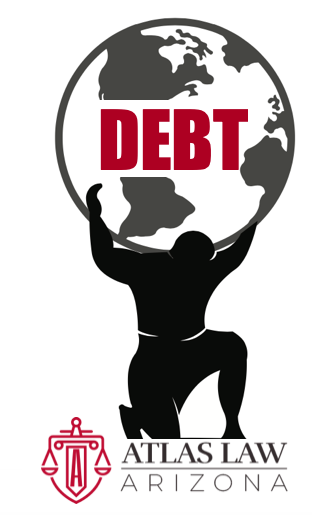Filing for bankruptcy is a significant decision that can have far-reaching consequences for your financial life. If you are considering filing for Chapter 7 or Chapter 13 bankruptcy in Arizona, you might be concerned about who will find out about your bankruptcy filing. Understanding the differences between Chapter 7 and Chapter 13 bankruptcy, as well as the confidentiality and public disclosure aspects of bankruptcy, is essential. This comprehensive guide will address these concerns and explain why seeking assistance from a reputable Arizona bankruptcy law firm like Atlas Law, LLC is crucial.

Understanding Chapter 7 and Chapter 13 Bankruptcy
Before delving into who will know about your bankruptcy filing, it is important to understand the differences between declaring Chapter 7 and Chapter 13 bankruptcy in Arizona.
Chapter 7 Bankruptcy: Liquidation Bankruptcy
Chapter 7 bankruptcy, also known as “liquidation bankruptcy,” is designed for individuals who cannot afford to repay their debts. In Chapter 7 bankruptcy, the debtor’s non-exempt assets are sold by a bankruptcy trustee, and the proceeds are used to pay off creditors. Most unsecured debts, such as credit card debt, medical bills, and personal loans, are discharged, meaning the debtor is no longer legally obligated to pay them.
Key Features of Chapter 7 Bankruptcy:
- Eligibility: To qualify for Chapter 7 bankruptcy, individuals must pass the means test, which compares their income to the median income in their state.
- Asset Liquidation: Non-exempt assets are sold to pay creditors. However, Arizona has specific exemptions that protect certain assets, such as your primary residence, vehicle, and personal belongings.
- Debt Discharge: Most unsecured debts are discharged, giving the debtor a fresh financial start.
- Duration: The entire process typically takes about 3-6 months from filing to discharge.
Chapter 13 Bankruptcy: Reorganization Bankruptcy
Chapter 13 bankruptcy, also known as “reorganization bankruptcy,” is designed for individuals with a regular income who can afford to repay some or all of their debts over time. In Chapter 13 bankruptcy, the debtor proposes a repayment plan to the bankruptcy court, which usually lasts 3 to 5 years. At the end of the repayment period, any remaining unsecured debts are discharged.
Key Features of Chapter 13 Bankruptcy:
- Eligibility: Individuals must have a regular income and meet certain debt limits to qualify for Chapter 13 bankruptcy.
- Repayment Plan: Debtors propose a repayment plan to the court, which details how they will repay their debts over 3 to 5 years.
- Asset Protection: Debtors can keep their assets, as long as they adhere to the repayment plan.
- Debt Discharge: At the end of the repayment period, any remaining unsecured debts are discharged.
- Duration: The repayment plan typically lasts 3 to 5 years.

Who Will Know About Your Bankruptcy Filing?
Filing for bankruptcy is a legal process that involves public records, which means certain information about your bankruptcy filing will be accessible to the public. However, this does not mean that everyone will automatically know about your bankruptcy. Here are the key parties who will be informed or have access to your bankruptcy filing information:
Contact Atlas Law Arizona experienced bankruptcy legal team today for a free initial consultation.
The Impact of Bankruptcy on Your Privacy
The public nature of bankruptcy filings can be a concern for many individuals. However, there are several factors to consider regarding the impact on your privacy:
Limited Public Interest
In most cases, there is limited public interest in individual bankruptcy filings. While your bankruptcy filing is a matter of public record, it is unlikely that friends, neighbors, or acquaintances will actively search for this information unless they have a specific reason to do so.
Privacy Protections
The bankruptcy process includes certain privacy protections. For example, sensitive information such as your Social Security number, birth date, and account numbers are redacted in public records to protect your identity and personal information.
Professional Confidentiality
Bankruptcy attorneys and trustees are bound by professional confidentiality standards. They are required to handle your case with discretion and respect your privacy throughout the process.
The Benefits of Filing for Bankruptcy
Despite concerns about privacy and public disclosure, filing for bankruptcy can provide significant benefits for individuals facing overwhelming debt. Here are some of the key advantages:
Debt Relief
Both Chapter 7 and Chapter 13 bankruptcy offer relief from unmanageable debt. Chapter 7 allows for the discharge of most unsecured debts, while Chapter 13 provides a structured repayment plan and eventual discharge of remaining unsecured debts.

Automatic Stay
The automatic stay immediately halts most collection actions by creditors, including wage garnishments, foreclosure proceedings, and repossession efforts. This provides temporary relief and allows you to focus on reorganizing your finances.
Fresh Start
Bankruptcy provides a fresh financial start by eliminating or restructuring your debts. This can be a crucial step in rebuilding your financial stability and planning for a more secure future.
Asset Protection
Chapter 13 bankruptcy allows you to retain your assets while repaying your debts through a court-approved repayment plan. Chapter 7 bankruptcy also includes exemptions that protect certain essential assets from liquidation.
Steps to Take if Considering Bankruptcy
If you are considering filing for Chapter 7 or Chapter 13 bankruptcy in Arizona, here are the steps you should take:
1. Assess Your Financial Situation
Evaluate your financial situation, including your income, expenses, debts, and assets. Determine whether bankruptcy is the right option for you and whether Chapter 7 or Chapter 13 bankruptcy is more suitable for your circumstances.
2. Consult with a Bankruptcy Attorney
Schedule a consultation with a bankruptcy attorney at Atlas Law, LLC. They can provide a thorough evaluation of your case, explain your options, and help you understand the potential outcomes of filing for bankruptcy.
3. Gather Necessary Documentation
Prepare all necessary documentation for your bankruptcy filing, including proof of income, a list of debts, and details about your assets. Your attorney at Atlas Law, LLC will guide you through the documentation requirements.
4. File the Bankruptcy Petition
With the assistance of your attorney, file the Chapter 7 or Chapter 13 bankruptcy petition with the bankruptcy court. Once filed, the automatic stay will go into effect, providing temporary relief from creditor actions.
5. Attend the Meeting of Creditors
Attend the meeting of creditors, also known as the 341 meeting. This is a mandatory meeting where the bankruptcy trustee and creditors can ask questions about your financial situation and bankruptcy filing.
6. Follow Through with the Bankruptcy Process
Work closely with your attorney to navigate the bankruptcy process, including complying with any court requirements, attending additional hearings if necessary, and completing any required financial management courses.
Contact our Arizona Chapter Bankruptcy Lawyers
Filing for Chapter 7 or Chapter 13 bankruptcy in Arizona can provide significant relief from overwhelming debt and a fresh financial start. While bankruptcy filings are a matter of public record, the likelihood of widespread public awareness is limited. Understanding who will know about your bankruptcy filing and the impact on your privacy is essential.
Seeking professional assistance from a reputable bankruptcy law firm like Atlas Law, LLC is crucial to ensure a successful outcome. With their expertise, personalized solutions, and compassionate guidance, Atlas Law, LLC can help you navigate the complexities of bankruptcy and achieve the financial relief you need.
If you are considering filing for bankruptcy, contact Atlas Law, LLC at (602)-649-4949 to schedule a consultation and take the first step towards financial stability and peace of mind. Our consultations are free of charge. Get yourself on the path to the “Fresh Start” that you deserve.





